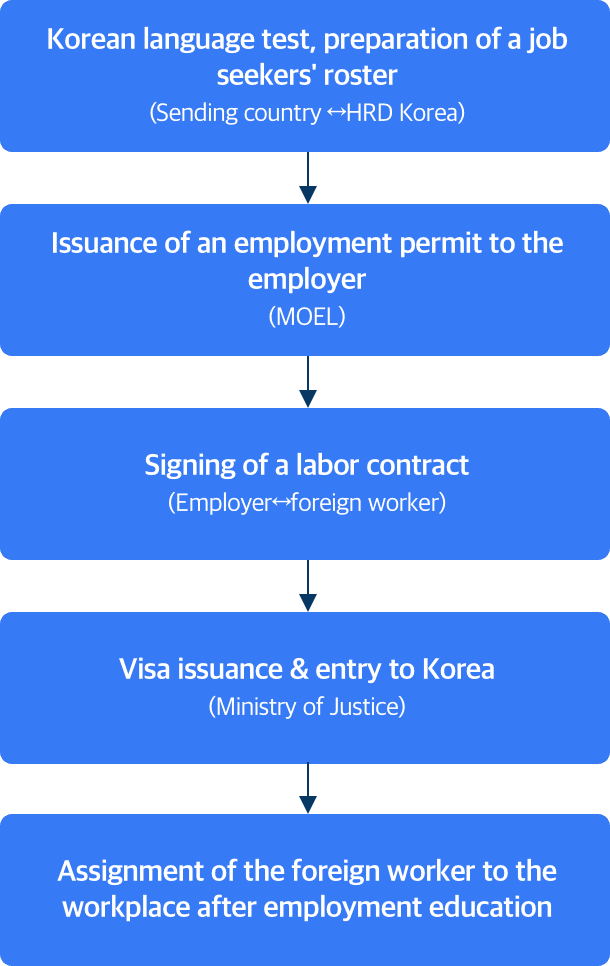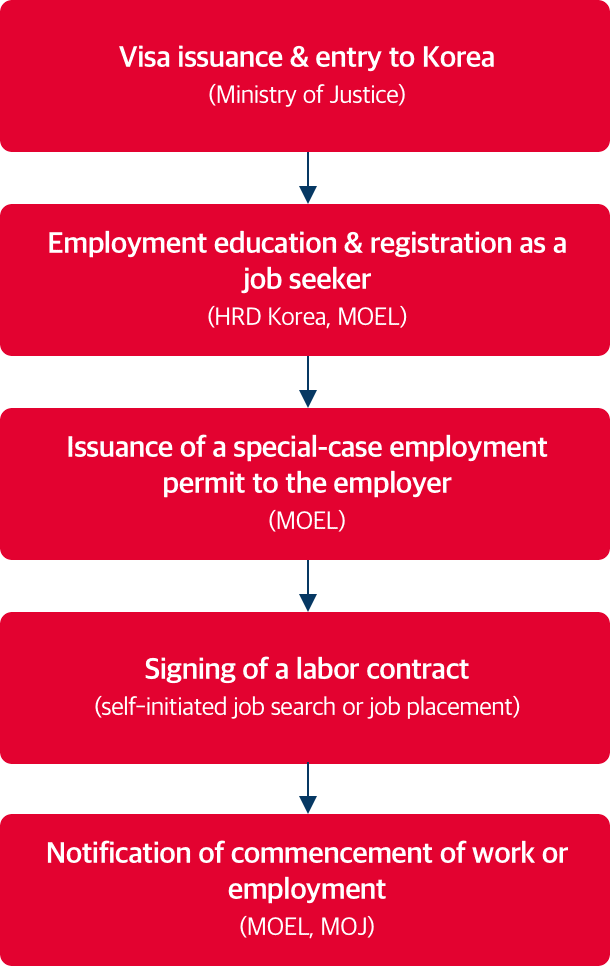International Cooperation & EPS
Promoting International Labor Cooperation
- Cooperation with international organizations
- Development cooperation
- Introduction of foreign workers to Korea (EPS)
-
International cooperation in the field of employment and labor can be broadly divided into the following categories: making exchanges with international organizations and other countries and providing assistance to developing countries (ODA); dealing with FTA negotiations and implementing FTAs; supporting foreign-invested companies in Korea and Korean companies abroad; and helping companies secure a workforce they need by bringing in foreign workers.
-
Cooperation with international organizations and FTA negotiations and implementation
As the demand for international policy coordination and exchanges in the field of employment and labor grew in the aftermath of the global employment crisis, Korea has actively taken part in international meetings, especially those organized by the G20, ILO, OECD, and APEC. The Korean government uses those international gatherings as the opportunity to present its best policies to the international community and pursue policy exchanges and cooperation with other countries.
MOEL is also involved in discussions on labor standards and employment issues, which are conducted as part of international economic and trade negotiations, such as FTA and WTO negotiations. It cooperates with the international community to promote labor rights by including a separate chapter on the promotion of labor rights in its FTAs with other countries. Recently, the promotion of labor mobility has emerged as an important issue in FTA negotiations, and MOEL has made efforts to produce the best negotiation outcomes on that matter.
In addition, to guarantee basic labor rights protection in line with the international standards, expert meetings and inter-ministerial meetings were held to analyze conflicts between domestic laws and systems and conventions and to explore improvement measures in 2019, which led to a bill submitted to the National Assembly intended to promote the ratification of the ILO fundamental conventions (Freedom of association, Prohibition of forced labor) that Korea has yet to ratify.
Development cooperation
-
Korea has contributed to the improvement of laws and systems in developing countries by carrying out the bilateral policy consultation project and the multilateral Korea-ILO partnership program, the two main pillars of its official development assistance (ODA).
The policy consultation project for developing countries was launched in 2012 for the purpose of contributing to the establishment and improvement of laws and systems in target developing countries by sharing Korea's policy development experience with recipient countries. The government organizes a public-private joint consultation team composed mainly of experts with abundant policy experience and shares Korea's policy development experience with developing countries by holding seminars and workshops for their policymakers and sending experts to those countries. To date, the government has conducted such policy consultations for nine countries--Vietnam, Mongolia, Sri Lanka, Uzbekistan, the Philippines, Myanmar, Cambodia, Laos and Peru--in four fields, such as vocational skills development, employment services and occupational safety and health.
Korea has also provided more than 10 million dollars in aid through the Korea-ILO partnership program since 2004, consolidating its position as a responsible donor country in the Asia-Pacific region. The program is aimed at strengthening developing countries' capability to comply with international labor standards and assisting them in improving their policies and systems to realize decent work. Through the program, Korea meets the demand for cooperation from developing countries in the Asia-Pacific region among others and shares its pioneering HRD experience and knowledge with them, contributing to labor administration, occupational safety and the establishment of social safety nets, such as social insurance in developing countries.
-
Through the international HRD exchange and cooperation program implemented since 2017, Korea is has achieved a milestone in the expansion and improvement of its ODA. The government is expanding into a new type of ODA projects involving Korean businesses seeking to go global, including a project to set up an online employment service platform in Vietnam.
Introduction of foreign workers to Korea
-
Meanwhile, since August 2004, the government has implemented the Employment Permit System (EPS) to replace the industrial trainee system, with the aim of supplying production workers to companies with a shortage of such workers more systematically while at the same time protecting the domestic labor market, strengthening the protection of foreign workers' rights and interests, and enhancing transparency in the sending process. In addition, the government operates the point-based selection system to bring in a reasonable number of foreign workers. It also makes various efforts to help foreign workers staying in Korea better adapt to Korean society, including providing them with tailored education and counseling services.
- Employment Permit System
-
The Employment Permit System allows SMEs failing to find native Korean workers to employ non-professional foreign workers legitimately after getting employment permits issued by the government.
Introduction of general foreign workers: Employment Permit System (E-9)


- Korean language test, preparation of a job seekers' roster (Sending country ↔HRD Korea)
- Issuance of an employment permit to the employer (MOEL)
- Signing of a labor contract (Employer↔foreign worker)
- Visa issuance & entry to Korea (Ministry of Justice)
- Assignment of the foreign worker to the workplace after employment education
* Foreign workers are prohibited from moving from one industry to another, but allowed to move from one workplace to another up to three times during the first three years of employment, and up to twice during the one year and ten months after reemployment, as long as they have any reason prescribed by the law. (However, a change of workplaces for any reason attributable to the employer, such as business suspension or shutdown, is not counted towards the total number of workplace changes.)
Employment of ethnic Koreans: Working Visit System (H-2)


- Visa issuance & entry to Korea (Ministry of Justice)
- Employment education & registration as a job seeker (HRD Korea, MOEL)
- Issuance of a special-case employment permit to the employer (MOEL)
- Signing of a labor contract (self-initiated job search or job placement)
- Notification of commencement of work or employment (MOEL, MOJ)
* Ethnic Koreans find work after entering Korea and can freely move from one sector to another and from one workplace to another.
- Support for foreign workers staying in Korea
-
Ethnic Koreans (H-2 working visit visa holders) and foreign workers (E-9 visa holders) who enter Korea through the Employment Permit System are offered various services, including grievance counseling, Korean language education and education about laws on everyday life, to support their stay in Korea.
(Support Centers for Foreign Workers) A total of nine hub centers and 35 small-area centers are operating to provide grievance counseling, Korean language education, knowledge on basic Korean law for everyday life, digital technology education.
(Counseling Center for Foreign Workers) The Counseling Center for Foreign Workers helps resolve foreign workers' grievances promptly via phone counseling (call center, ☎1577-0071).
(Employer education) Employers are provided with education to help transferred employees to their establishments stay employed for a longer term, to resolve conflict, to improve awareness on foreign workers to better manage them.
(Vocational skills development training for foreign workers in employment) Foreign workers currently in employment are provided with vocational skills development training to strengthen their adaptability in the workplace and help improve corporate productivity.
(Operation of Councils for the Protection of Foreign Workers' Rights and Interests) Every local employment and labor office has a council for protection of foreign workers' rights and interests where measures to resolve conflicts between foreign workers and their employees and measures to provide better support to foreign workers are discussed.
* Each council is composed of members from organizations that represent workers, employers and foreign workers.